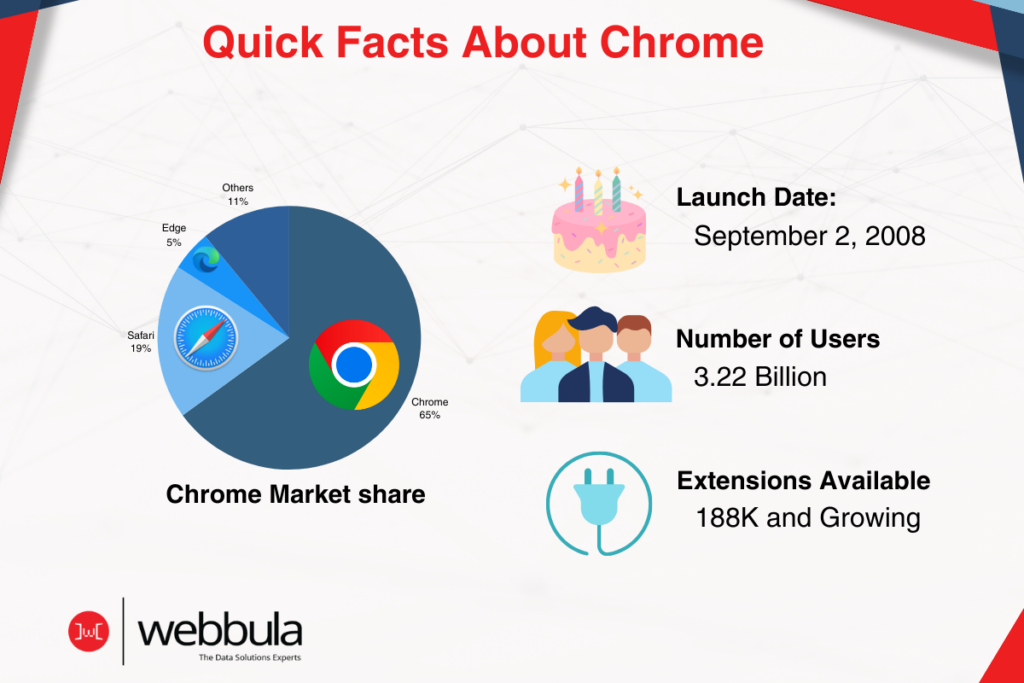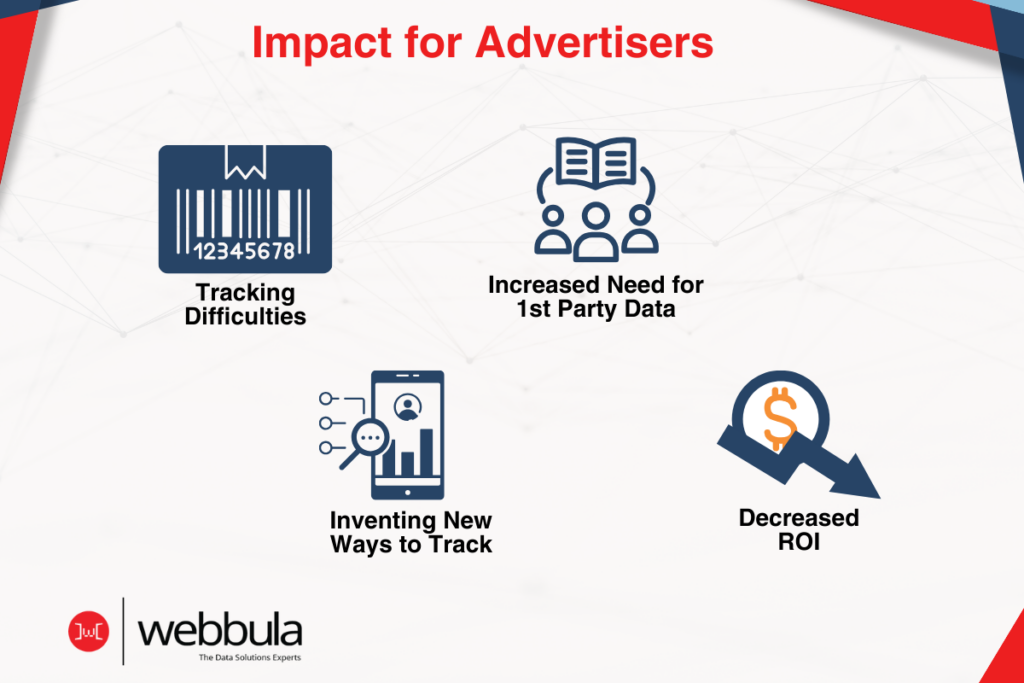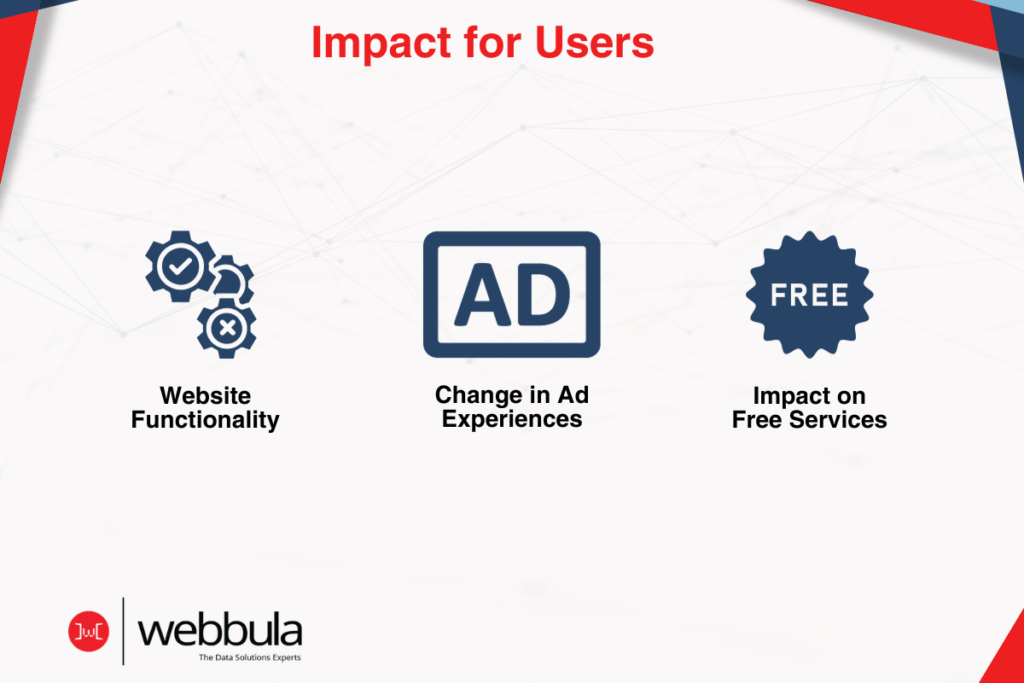Table of Contents
Key Takeaways
In an age where digital innovation intersects with heightened privacy concerns, Google Chrome’s decision to phase out third-party cookies by mid-2024 represents a watershed moment in digital advertising and user privacy. This blog post not only explores the immediate implications of this shift but also delves into broader strategies for advertisers in a rapidly transforming digital landscape, highlighting the pioneering role of entities like Webbula in navigating these changes.
Key Takeaways
- The discontinuation of third-party cookies in Chrome signifies a major transition in digital advertising.
- Advertisers are poised to face new challenges in audience targeting and data collection, urging a shift towards more innovative practices.
- Users will experience changes in their online ad experiences.
- Deterministic data, championed by industry leaders like Webbula, offers a viable and precise alternative for audience targeting in a cookie-less world.
- Future-proofing strategies in digital advertising involve embracing new trends, adapting to privacy laws, continuous innovation, and marketing tactics.
The End of Third-Party Cookies in Chrome
Before delving into the implications of Google Chrome’s decision, it’s crucial to understand what cookies are. In the context of the internet, cookies are small pieces of data sent from a website and stored on the user’s computer by the web browser while the user is browsing. These cookies help websites remember information about your visit, making your next visit easier and the site more useful to you.
Third-party cookies are created by domains other than the one the user is visiting directly, hence the term “third-party.” They are often used for online-advertising purposes and placed on a website through a script or tag. These cookies collect data about a user’s online behavior and preferences, enabling targeted advertising across different sites. However, with Google’s plans to block third-party cookies in Chrome, the landscape of digital advertising is set to change significantly.
Implications for Advertisers and Users
The transition away from third-party cookies in Chrome significantly alters the landscape for both advertisers and users, presenting a mix of challenges and opportunities.
For Advertisers:
- Targeting Difficulties: Without third-party cookies, advertisers will lose a key tool for tracking user behavior across multiple sites. This makes it harder to build comprehensive user profiles, which are essential for targeted advertising.
- Increased Reliance on First-Party Data: Advertisers will need to rely more on first-party data, which is information collected directly from their audience. This shift necessitates stronger direct relationships with customers and more robust data collection strategies.
- Innovative Tracking Solutions: The industry is likely to see a rise in alternative tracking technologies. Advertisers will need to explore and adapt to new tools and methods, such as contextual advertising, which targets ads based on the content of the website, rather than user behavior.
- Potential for Decreased ROI: Initially, advertisers might see a decrease in the return on investment (ROI) for their campaigns, as they adapt to less precise targeting methods. Over time, however, new strategies and technologies may offset this challenge.
For Users:
- Modified Website Functionality: The absence of cookies in Chrome will lead to changes in how websites function. Users might experience more frequent logins and a loss of personalized settings, as cookies are typically used to remember such preferences. Online shopping could be less seamless, with items in shopping carts not being remembered between sessions. Additionally, website analytics and cross-website features like single sign-on services may become less efficient, impacting overall user convenience on the web.
- Change in Online Ad Experience: Users may notice a change in the types of ads they see. Without targeted ads based on their browsing history, they might encounter more generic or less relevant advertisements.
- Impact on Free Services: Many online services rely on ad revenues, which are driven by targeted ads. The phasing out of third-party cookies could impact the economic model of these services, potentially leading to changes in how content and services are offered.
Balancing Act:
This paradigm shift requires a balancing act: advertisers need to find new ways to effectively reach their audience while respecting privacy, and users must navigate changes in the online landscape as the industry adapts to these new privacy standards.
Embracing Deterministic Data
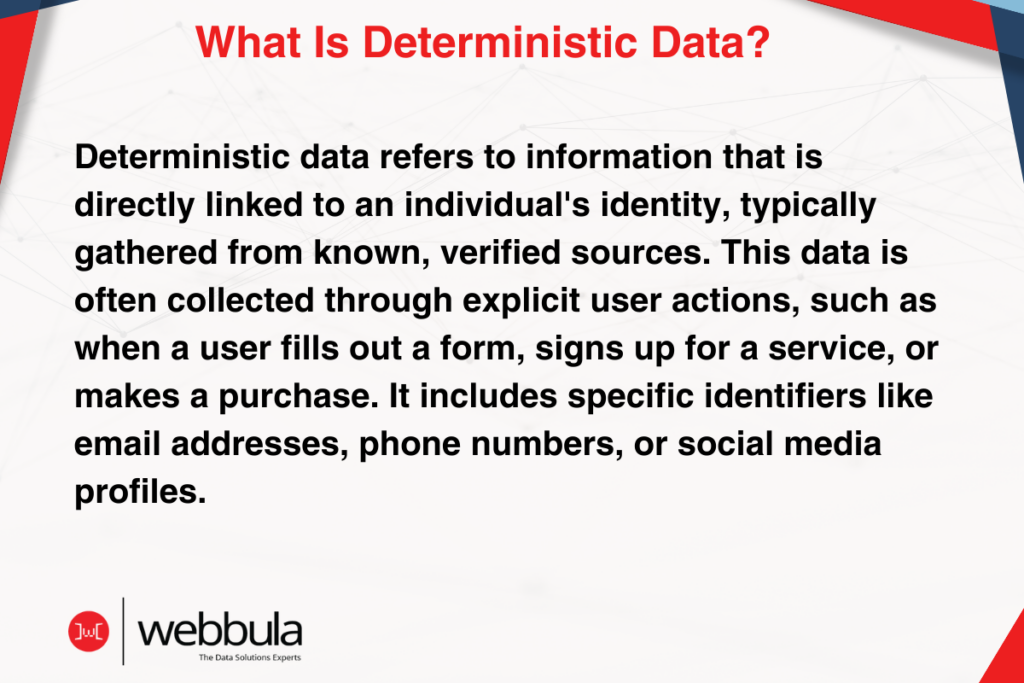 In the evolving digital landscape sans third-party cookies, deterministic data emerges as a key player. But what exactly is deterministic data? In simple terms, deterministic data refers to information that is directly linked to an individual’s identity, typically gathered from known, verified sources. This data is often collected through explicit user actions, such as when a user fills out a form, signs up for a service, or makes a purchase. It includes specific identifiers like email addresses, phone numbers, or social media profiles.
In the evolving digital landscape sans third-party cookies, deterministic data emerges as a key player. But what exactly is deterministic data? In simple terms, deterministic data refers to information that is directly linked to an individual’s identity, typically gathered from known, verified sources. This data is often collected through explicit user actions, such as when a user fills out a form, signs up for a service, or makes a purchase. It includes specific identifiers like email addresses, phone numbers, or social media profiles.
Unlike probabilistic data, which is based on likelihoods and assumptions about user behaviors, deterministic data offers a high degree of accuracy and reliability. It’s sourced from first-party interactions, meaning that the information is obtained directly from the user, ensuring both precision and relevance in targeting.
In the absence of third-party cookies, deterministic data offers a robust alternative for advertisers. This data type allows for precise audience targeting, as it is based on actual user inputs and verified sources, ensuring higher accuracy and relevance in advertising campaigns.
Webbula’s Pioneering Role in a Cookie-less World
As the digital advertising ecosystem prepares to navigate the post-third-party cookie era, Webbula’s position as a leader in the field becomes ever more relevant and impactful.
- Leveraging Deterministic Data with Accolades: Webbula’s Programmatic Data service, known for its commitment to precision and quality, has been recognized by Truthset, a data intelligence company. This accolade underscores Webbula’s accuracy and reliability in providing deterministic data, setting a high industry standard.
- Commitment to Ethical Data Sourcing: Beyond accuracy, Webbula places a strong emphasis on ethical data sourcing. The company adheres to stringent data privacy and protection standards, ensuring that the data used is not only precise but also responsibly sourced and compliant with current privacy regulations.
- Customized and Effective Audience Targeting: Utilizing Webbula’s deterministic data allows advertisers to engage with their target audiences more effectively. This data is derived from direct, verified survey responses, ensuring high relevance and accuracy in targeting, which is vital in the absence of third-party cookies.
- Innovative Solutions for the New Era: Webbula is at the forefront of developing innovative solutions tailored for the emerging challenges in digital advertising. By embracing new technologies and methodologies, Webbula is helping advertisers smoothly transition into the new landscape, maintaining campaign effectiveness without compromising user privacy.
- A Partner in Adapting to Change: Webbula’s Programmatic Data service is not just a tool; it’s a partnership in adapting to change. With its expertise and recognition in the field, Webbula assists advertisers in navigating these uncharted waters, ensuring that the shift away from traditional cookie-based strategies is a journey towards more ethical, effective, and sustainable advertising practices.
Preparing for the Future: Broader Strategies in Digital Advertising
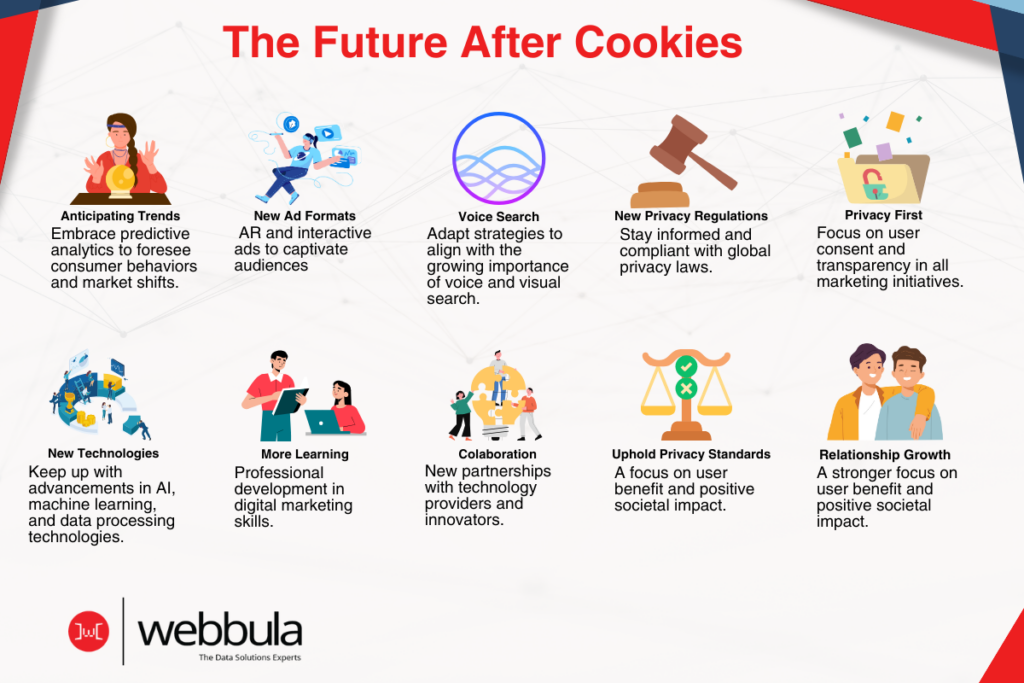 As the digital advertising world braces for a post-third-party cookie era, it’s crucial for advertisers to look beyond immediate changes and prepare for long-term industry evolution. Here’s how businesses, with the help of forward-thinking partners like Webbula, can stay ahead:
As the digital advertising world braces for a post-third-party cookie era, it’s crucial for advertisers to look beyond immediate changes and prepare for long-term industry evolution. Here’s how businesses, with the help of forward-thinking partners like Webbula, can stay ahead:
- Anticipating Industry Trends: Embrace predictive analytics to foresee consumer behaviors and market shifts.
- Innovating with New Ad Formats: Explore AR and interactive ads to captivate audiences.
- Preparing for Voice and Visual Search Optimization: Adapt strategies to align with the growing importance of voice and visual search.
- Adapting to Evolving Privacy Regulations: Stay informed and compliant with global privacy laws.
- Prioritizing Privacy-First Marketing: Focus on user consent and transparency in all marketing initiatives.
- Investing in Technology: Keep up with advancements in AI, machine learning, and data processing technologies.
- Encouraging Continuous Learning: Promote ongoing professional development in digital marketing skills.
- Fostering Collaborative Ecosystems: Build partnerships with technology providers and innovators.
- Upholding Ethical Standards in Data Use: Focus on user benefit and positive societal impact.
- Building Strong Customer Relationships: Engage with online communities to build a loyal customer base.
Conclusion
As we stand at the cusp of a significant transformation in digital advertising, it’s clear that the phase-out of third-party cookies is just the tip of the iceberg. For advertisers and businesses, this change is not just about adapting to a cookie-less environment but also about embracing a holistic shift towards more ethical, innovative, and user-focused practices. Companies like Webbula are leading the way in this new era, demonstrating how to harness deterministic data and ethical strategies to thrive.


